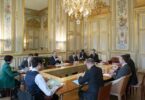Abdullah Muradoglu
The first half of the 20th century was marked by two world wars, and the second one was shaped by the Cold War and the plethora of proxy conflicts that followed.
Those 40 long years ended with the Soviet Union throwing in the towel in the late 1980s. Yet, it did not necessarily lead to a better world.
Many of the problems that the Cold War helped conceal have been laid bare. After the collapse of the Soviet Union, inequality in wealth and income distribution has only increased.
The neo-liberal financial order led to global financial crises in 1997 and 2007. The global economy, ensnared by financial capitalism, is still reeling under the repercussions of the 2007-2008 crisis. Actually, Neo-liberalism as we know it is no more, but the narrators of this story continue to beat this dead horse. It seems that Neo-liberalism, in the form of an armored cadaver, will be treated as alive until a new narrative is established.
Currently, our world is hurtling towards the old model called Neo-mercantilism.
Many experts argued that Neo-Mercantilism, which left its mark on the economies of the 16th and 17th centuries, continued to covertly thrive under the liberal capitalist system.
Of course, this was one of the reasons for the inequality between Center countries of the capitalist world system and the Peripheral ones.
In the 38th episode of the TV series Ezel, the rowdy Ramiz Karaski summarized the casino owner’s business dealings with Jilet Ahmet as follows: he used to distribute the money strangely, no matter the amount, it would still go around and find its way back to his hands.”
The liberal capitalist system, also known as Casino Capitalism, works in very much the same way. The residual financial value from the world economy always finds its way back to the Centers.
As we rung in 2022, m-urmurs of a New Cold War between Emerging China and Established Hegemon America are hard to miss.
China, which is flourishing in the global economic system, is seen as a new model of Mercantilism. However, since the Trump era in America, it has been smooth-sailing for Neo-mercantilism. America, under the guise of liberal democracy, is experiencing a deep dem-ocracy crisis. The trade w-ars between the U.S. and China are the symptom of a larger global geo-economic war.
The movie “Dune,” ada-pted from Frank Herbert’s legendary sci-fi novel, can help us understand what the wild nature of the new mercantilism looks like.
One critic chose to interpret it as “The Good, the B-ad and the Spice” in refere-nce to the famous American Western “The Good, the Bad and the Ugly” released in 1966. The most important source of the great power wars of the 20th century was oil.
Henry Kissinger, one of America’s famous strategi-sts, once said, “Control oil and you control nations.”
On the Desert Planet, on the other hand, oil is replaced by spice as an energy source.
“Whoever controls the spice, controls the universe,” says Baron Harkon-nen, the movie’s villain, as if straight out of George Orwell’s novel 1984.
In the context of the great technology competition between China and the U.S., the most important component of chip technology is semi-conductors.
According to strategists, advanced semiconductors are the oil of the digital age. Some authors describe this process as “Digital Neo-mercantilism.”
Major powers are competing for control over the global data empire. From this perspective, whoever controls the Internet controls the data, and whoever controls the data controls the world. The frenzied arms race associated with advanced technologies, on the other hand, is for the “power to control.”
Another development that will be discussed more in the context of the internet of the future in 2022 is “Metaverse”. This “Digital Universe” is based on virtual reality (VR) or augmented reality (AR).
We need to analyze the quests behind these attempts to build a digital universe parallel to our physical world. Meanwhile, inventions, pursuits, ideas develop in vacuums after all. Isn’t the search for a new monetary system or a new economy also closely tied to financial crises?
It is clear that this calls f-or more reflection, more contemplation on how to transform all these developments in order to enable hu-manity to wake up to a better world. As Duncan Ida-ho, the mentor of Dune’s protagonist Paul Atreides, said: “Dreams make good stories. But everything important happens when we’re awake. Because that’s when we make things happen.”






